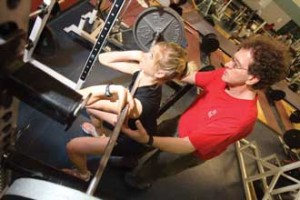
Strength coach Claude Hébert gives uplifting lessons on courage
By Neale McDevitt
Few people have a better understanding of the body’s incredible potential for power – and its inherent fragility – than Claude Hébert. Renowned for producing some of Canada’s top strongmen and women as one of the nation’s top weightlifting coaches in the 1980s and ’90s, Hébert now plies his trade as McGill’s varsity strength coach.
But as Hébert implores his charges to push themselves to their physical limits, his left arm shakes uncontrollably, his aching back forces him to stoop and he shuffles around the room on unsteady feet. He was diagnosed with Parkinson’s disease in 1997 and today, despite his daily cocktail of 25 pills, Hébert is having a bad day.
“I already suspected I had Parkinson’s,” said Hébert, remembering the day he received the fateful diagnosis. “But hearing a doctor actually say it was a real shock. Aside from the death of my daughter, I have never been so devastated.”
A degenerative disease of the central nervous system, Parkinson’s is characterized by muscle rigidity, tremors, slowing of physical movement and speech impairment. In extreme cases, the disease can lead to loss of physical movement.
For Hébert, it also precipitated a 10-year spiral in which he lost control of his life. Soon after the diagnosis, his nine-year relationship ended, he found it increasingly difficult, then impossible, to coach the sport he loved, and he wound up living in a squalid one-room apartment where drug addicts would break down his door mistakenly looking for a fix. “I pretty much hit bottom,” he said.
Last summer, Hébert was walking downtown and decided to take a peek at McGill’s athletic complex, a place he spent a fair bit of time in as a student in the 1970s. “I was really just killing time that day, because I was apparently without responsibility any more,” he said with a wry smile.
Chatting with a few people, Hébert was introduced to Dennis Barrett who was looking for someone to oversee the varsity weight room. With his wealth of experience, Hébert was a natural choice.
Beginning as a volunteer, Hébert was offered a contract in the fall of 2008. But the job didn’t come without plenty of apprehension. Away from the game for a decade, Hébert admits he was somewhat reticent. “I was worried that I would waste people’s time – especially the athletes. And time isn’t a commodity athletes have a lot of,” Hébert said.
Instead, he flourished. Rekindling his lost passion, Hébert has poured himself into his work. Always known as one of the more cerebral coaches in Canada, he began scouring the Internet and poring over books on advanced training methods, sports psychology, nutrition and physiology. “I was hit by the bug again,” he said with a smile. “But the bite was even bigger than before.”
Far from the stereotypical bull-necked, barrel-chested strength coach, the lanky Hébert with his shock of Einstein-esque hair, looks more professor than powerlifter. And it is an image that suits him well. “When I first walked in [to the varsity weight room] they had a boom box in the corner blasting songs with some really obscene lyrics,” he said. “I asked the athletes if their professors let them play that in the classroom.
“They said ‘of course not.’ Well, the weight room is also their classroom and they should treat it with the same respect.” Today, it is an earphones-only environment completely free of the cacophony of blaring music that so often characterizes many training centres.
In the gym every day of the week, Hébert is happily working again; taking young athletes and helping them realize their dreams. At the same time, he feeds off their youth and enthusiasm. “I’m not here to teach people, I’m here to share with them. They give me their time and dedication and I give them my knowledge. It is inspiring to be surrounded by so many wonderful, talented people.”
And while McGill athletes can only benefit from that knowledge, Hébert is also growing stronger. “This is my sanctuary in the sense that I feel protected here,” he said, scanning the weight room. “This is the only place where I feel I have a role and I know I have a value.
“I’ve stopped listening to the people who tell me that one day I won’t be able to move. As long as I have a head on my shoulders, as long as I have something to care about, I’ll be fine.”
